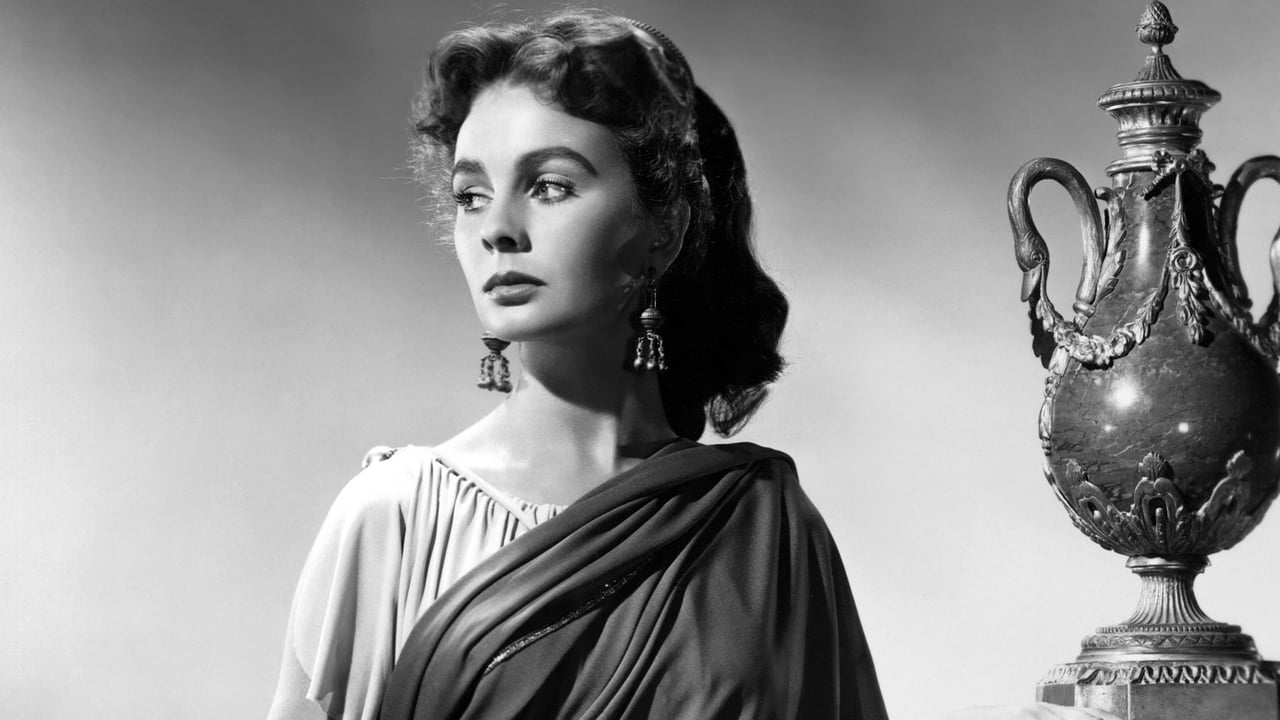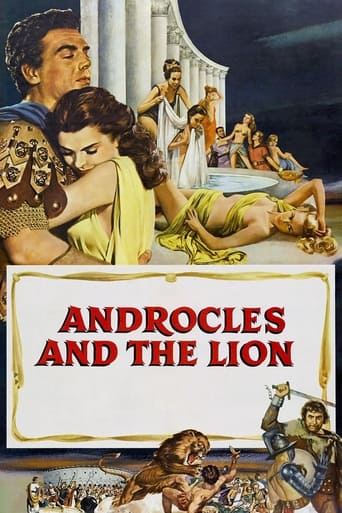

An adaptation of a lesser George Bernard Shaw play. It supposedly doesn't "get" the original play, at least according to some other reviews I perused. I'm not even sure what the point of it all was (perhaps that, throughout all times, Christians have been annoyingly self-righteous, but at least during Roman days, you could feed them to lions), and it's a pretty big mess. However, I have to admit, almost grudgingly, that I sort of enjoyed it, perhaps just because of its weirdness. Alan Young plays Androcles, a comedic character with a hen-pecking wife (Elsa Lanchester, really playing it up - I have to wonder why they didn't have her carry a rolling pin). Because of his apparent friendship with a lion (from whose paw, of course, he pulled a thorn), people accuse him of witchcraft, and he is suggested to the Caesar (Maurice Evans) as a potential sacrifice. Also among those sacrifices are Jean Simmons, a beautiful young Christian, and Robert Newton, a pious warrior. Young is amusing in his way, and Evans is quite amusing, but the real reason to watch this film are for Simmons and Newton, both of whom are wonderful. Victor Mature is the least successful member of the cast, playing an army captain who falls for Simmons. He looks as if he's about to have a stroke most of the time. Alan Young is perhaps most famous for playing Wilbur on Mr. Ed, but to my generation he's even better known as the voice of Scrooge McDuck in stuff like Mickey's Christmas Carol and, of course, DuckTales. He's in his 90s nowadays and is still doing Scrooge McDuck.
... View MoreIn reference to a previous comment, the Lion's name, Tommy, comes from the original text of Shaw's play at the end of Act II. Androcles also talks baby talk to the Lion while he is removing the thorn from his paw in the Prologue (or first scene) of the play. Also I think Victor Mature does a pretty good job as the Captain, although some might be put off by the clash of his accent and acting style with the rest of the mostly British cast. However, Mature's style is well suited to the no-nonsense, pragmatic officer trying desperately to save the patrician Lavinia from being sacrificed in the arena. He tells her to lie and recant her Christian beliefs if that is what it takes to save her life; then she can go home and believe whatever she wants. Mature's less polished acting style underscores his amoral pragmatism as well as his worldly desire for Lavinia. He is her temptation, her incentive the deny her faith. That she resists this demonstrates her dedication to her religion.
... View MoreG.B.S. declared in the lengthly "Preface" to this play, written years after its 1913 premiere (the "Preface is actually longer than the play itself), that he had written it in pique at the one J.M. Barry play he had ever thoroughly disliked - PETER PAN! The sentiment certainly sets a bench mark for measuring what Shaw may have accomplished in his charming, witty examination of a "Greek wizard" Christian (Androcles) who finds animals of all stripes and species more lovable and easy to get along with than his long (and vocally) suffering wife and neighbors.It also may explain why Hollywood missed with this neatly produced filming despite a number of inspired casting choices (Maurice Evans as Caesar, Elsa Lanchaster as Androcles' wife & Robert Newton as the warrior/Christian, Ferrovius) and deft directorial touches.In trying to focus on the "family friendly" (deadly words in the Hollywood lexicon) aspects of Shaw's charming satire, the film gives a bad case of the "cutsies" to the central role (it would have been interesting to see this Alan Young performance before he became so identified with his role, Wilbur, in TV's iconic MR. ED) and soft pedals or ignores most of the legitimately humorous byplay among his fellow Christians who wish martyrdom to wildly varying degrees and the infighting of the professional gladiators who echo (in somewhat more bloodthirsty fashion) the outrageous practicality of Captain Bluntschli in Shaw's early ARMS AND THE MAN.Having made the decision to play the lion *as* a lion (before or after Harpo Marx departed the production?), the delicious hold on adult satire Shaw infused his play with was probably a lost cause, but what remains remains a very pleasant diversion worth a Saturday afternoon. For lovers of good Shaw however, it's more than a little watered down - perhaps most surprising of all, more watered down that the later equally enjoyable musical version Richard Rodgers and Peter Stone did for TV with Noel Coward as Caesar and Norman Wisdom as Androcles!
... View MoreThis 1952 film was the first film version of a George Bernard Shaw play produced after the playwright's death, and the compromises are already obvious.Shaw had had artistic control over three films produced from his plays-- the 1938 "Pygmalion", "Major Barbara" (1941) and "Caesar and Cleopatra" (1945), and his influence had clearly been felt, some would say for both good and bad. He had had absolute final say-so over the casting, and, after his experience with "Pygmalion", Shaw became somewhat more demanding and insisted that not a word be cut from both "Major Barbara" and "Caesar and Cleopatra", a decision that resulted in both of these excellent films being flops. "Androcles and the Lion" clocks in at less than two hours.The casting suffers without Shaw's influence. Because this is an RKO release directed by Chester Erskine, a not especially distinguished American director, the cast features two American actors in major roles, and the clash between their style of acting, and that of the British actors who HAVE had experience with Shaw, is apparent. Some other American actors can be seen in bit roles.In a blatant effort to court the average movie audience who wouldn't recognize a Shaw play if it hit them in the face, movie hunk Victor Mature (yes, the very same actor who appeared in "The Robe" and "Samson and Delilah") is cast in the somewhat demanding role of a Roman captain trying to understand the Christian martyrs. An actor like James Mason or Stewart Granger might have been perfect and would have had the necessary acting ability, but Mature, although apparently trying hard, comes close to wrecking the film and destroying its Shavian flavor. And he gets second billing!Alan Young, whom most people will remember as Wilbur from the "Mr.Ed" TV series, is also American, but is a far better actor than Mature, and although his style sometimes seems as if it straight out of a sitcom rather than a Shaw play, Young does quite a good job in the all-important lead role of Androcles. But was it the Hollywood adaptors, or is it REALLY Shaw who gave the lion the endearing name of "Tommy"? Or is that just another sop to the movie-going crowd who loves animals with cute names?The rest of the cast is just fine--Jean Simmons excellent, and not syrupy, as a devout woman willing to face martyrdom in the arena, Robert Newton, hilarious as a hulking strongman converted to Christianity who can barely be kept from singlehandedly demolishing his enemies, Noel Willman, Elsa Lanchester in the brief role of Androcles' wife, and, in his best screen performance, Maurice Evans (Dr. Zaius in the 1968 "Planet of the Apes") as the Roman emperor. They make this film exactly what it should be.
... View More